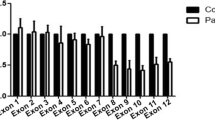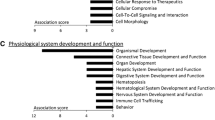Abstract
Purpose
DNA repair genes Minichromosome maintenance complex component (MCM) 8 and 9 have been linked with gonadal development, primary ovarian insufficiency (POI), and age at menopause. Our objective was to characterize MCM 8 and 9 gene expression in the menstrual cycle, and to compare MCM 8/9 expression in POI vs normo-ovulatory women.
Methods
Normo-ovulatory controls (n = 11) and unexplained POI subjects (n = 6) were recruited. Controls provided three blood samples within one menstrual cycle: (1) early follicular phase, (2) ovulation, and (3) mid-luteal phase. Six of 11 controls only provided a follicular phase sample. Amenorrheic POI subjects provided a single, random blood sample. MCM8/9 expression in peripheral blood was assessed with qRTPCR. Analyses were performed using delta-Ct measurements; group differences were transformed to a fold change (FC) and confidence interval (CI). Differences across menstrual cycle phases were compared using random effects ANOVA. Two-sample t tests were used to compare two groups.
Results
MCM8 expression was significantly lower at ovulation and during the luteal phase, when compared to the follicular phase [FC = 0.69 in the luteal vs follicular phase (p = 0.012, CI = 0.53, 0.90); and 0.65 in the ovulatory vs follicular phase (p = 0.0057, CI = 0.50, 0.85)]. No change in MCM9 expression was noted throughout the menstrual cycle. No significant difference was seen in MCM8/9 expression when comparing POI to control subjects.
Conclusions
Our study showed greater MCM8 expression in the follicular phase of the menstrual cycle, compared to the ovulatory and luteal phases. No cyclic changes were seen with MCM9. Significant differences in MCM8/9 expression were not detected between POI and controls; however, we recommend further investigation with a larger sample population.




Similar content being viewed by others
References
Strauss J, Barbieri R, editors. Yen and Jaffe’s reproductive endocrinology: physiology, pathophysiology and clinical management. Seventh ed. Philadephia PA: Elsevier Saunders; 2014.
Perry JR, Corre T, Esko T, Chasman DI, Fischer K, Franceschini N, et al. A genome-wide association study of early menopause and the combined impact of identified variants. Hum Mol Genet. 2013;22(7):1465–72.
Stolk L, Perry JR, Chasman DI, He C, Mangino M, Sulem P, et al. Meta-analyses identify 13 loci associated with age at menopause and highlight DNA repair and immune pathways. Nat Genet. 2011;44(3):260–8.
Qin Y, Jiao X, Simpson JL, Chen ZJ. Genetics of primary ovarian insufficiency: new developments and opportunities. Hum Reprod Update. 2015;21(6):787–808.
Lutzmann M, Grey C, Traver S, Ganier O, Maya-Mendoza A, Ranisavljevic N, et al. MCM8- and MCM9- deficient mice reveal gametogenesis defects and genome instability due to impaired homologous recombination. Mol Cell. 2012;47(4):523–34.
Schuh-Huerta SM, Johnson NA, Rosen MP, Sternfeld B, Cedars MI, Reijo Pera RA. Genetic markers of ovarian follicle number and menopause in women of multiple ethnicities. Hum Genet. 2012;131:1709–24.
Nelson LM. Clinical practice. Primary ovarian insufficiency. N Engl J Med. 2009;360(6):606–14.
Desai S, Wood-Trageser M, Matic J, Chipkin J, Jiang H, Bachelot A, et al. MCM8 and MCM9 nucleotide variants in women with primary ovarian insufficiency. J Clin Endocrinol Metab. 2017;102:576–82.
Tenenbaum-Rakover Y, Weinberg-Shukron A, Renbaum P, Lobel O, Eideh H, Gulsuner S, et al. Minichromosome maintenance complex component 8 (MCM8) gene mutations result in primary gonadal failure. J Med Genet. 2015;52:391–9.
AlAsiri S, Basit S, Woods-Trageser MA, Yatsenko SA, Jeffries EP, Surti U, et al. Exome sequencing reveals MCM8 mutation underlies ovarian failure and chromosomal instability. J Clin Invest. 2015;125:258–62.
Dou X, Guo T, Li G, Zhou L, Qin Y, Chen Z. Minichromosome maintenance complex component 8 mutations cause primary ovarian insufficiency. Fertil Steril. 2016;106(6):1485–9.
Bouali N, Francou B, Bouligand J, Lakhal B, Malek I, Kammoun M, et al. New MCM8 mutation associated with premature ovarian insufficiency and chromosomal instability in a highly consanguineous Tunisian family. Fertil Steril. 2017;108(4):694–702.
Fauchereau F, Shalev S, Chervinsky E, Beck-Fruchter R, Legois B, Fellous M, et al. A non-sense MCM9 mutation in a familial case of primary ovarian insufficiency. Clin Genet. 2016;89:603–7.
Woods-Tragesar M, Gurbuz F, Yatsenko SA, Jeffries EP, Kotan LD, Surti U, et al. MCM9 mutations are associated with ovarian failure, short stature and chromosomal instability. Am J Hum Genet. 2014;95(6):754–62.
Yatsenko SA, Rajkovic A. Reproductive aging and MCM8/9. Oncotarget. 2015;6(18):15750–1.
He DM, Ren BG, Liu S, Tan LZ, Cieply K, Tseng G, et al. Oncogenic activity of amplified miniature chromosome maintenance 8 in human malignancies. Oncogene. 2017;36(25):3629–39.
Author information
Authors and Affiliations
Corresponding author
Ethics declarations
Ethical approval
All procedures performed in studies involving human participants were in accordance with the ethical standards of the institutional and/or national research committee and with the 1964 Helsinki declaration and its later amendments or comparable ethical standards.
Informed consent
Informed consent was obtained from all individual participants included in the study.
Rights and permissions
About this article
Cite this article
Dondik, Y., Lei, Z., Gaskins, J. et al. Minichromosome maintenance complex component 8 and 9 gene expression in the menstrual cycle and unexplained primary ovarian insufficiency. J Assist Reprod Genet 36, 57–64 (2019). https://doi.org/10.1007/s10815-018-1325-z
Received:
Accepted:
Published:
Issue Date:
DOI: https://doi.org/10.1007/s10815-018-1325-z




